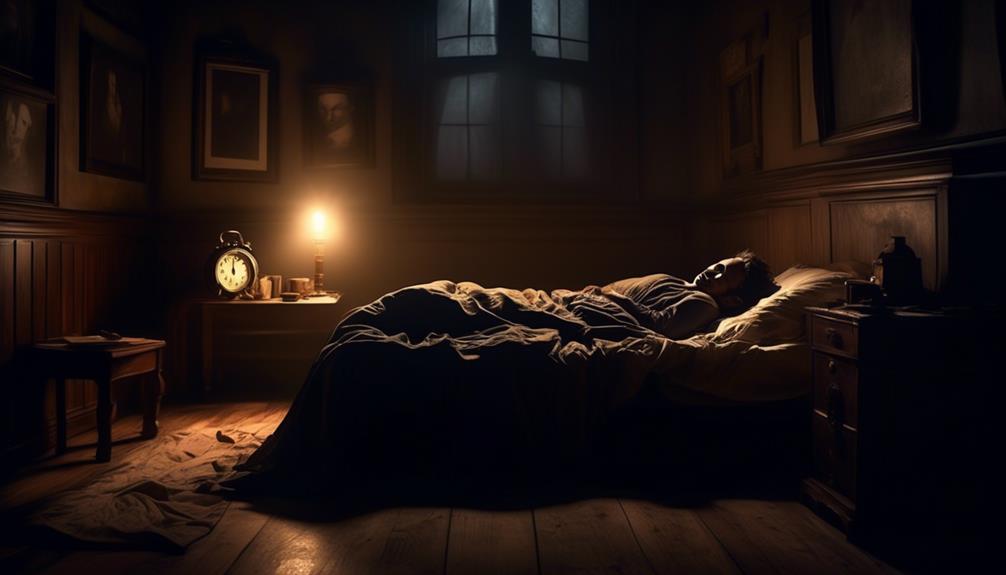Have you ever felt the overwhelming feeling of being lost at sea, trying to find your way back to safety as darkness falls? The fear of our own mortality can overwhelm us, especially when the world is quiet and sleep eludes us.
But what if this fear is more than just a passing worry in the night? What if it's a symptom of a deeper-rooted fear that keeps us awake, staring into the dark?
Key Takeaways
- Fear of death can lead to somniphobia and insomnia.
- Cognitive Behavioral Therapy is effective for fear-related sleep issues.
- Mindfulness and relaxation techniques help reduce anxiety for better sleep.
- Seeking professional help tailored to address death-related insomnia is crucial.
Understanding the Fear of Death
Understanding the fear of death can be a complex and deeply personal journey that involves exploring feelings of anxiety, dread, and distress associated with the concept of mortality. For some individuals, this fear can escalate into somniphobia, a specific phobia characterized by an intense fear of falling asleep and never waking up. This fear of dying during sleep can lead to insomnia and other sleep disorders, impacting overall well-being.
Cognitive behavioral therapy (CBT) is often recommended as an effective treatment option for addressing death anxiety and related sleep disturbances. Through therapy, individuals can learn to challenge negative thought patterns, develop coping mechanisms, and gradually reduce their fear of death, leading to improved sleep quality and overall mental health.
It's important to acknowledge that seeking help is a sign of strength, and therapists can provide a supportive environment for individuals to explore and process their fears surrounding mortality.
Impact of Mortality Anxiety on Sleep

The impact of mortality anxiety on sleep manifests through disruptions caused by negative self-talk, fear, and heightened stress levels before bedtime. When consumed by thoughts of death, our minds can spiral into a state of hyperarousal, making it difficult to relax and drift off to sleep peacefully. This heightened anxiety can lead to insomnia, resulting in poor sleep quality and duration.
The fear of death may even trigger nighttime panic attacks, further exacerbating the struggle to find rest. Managing death anxiety is essential not only for improving sleep patterns but also for enhancing overall well-being. By addressing these fears and negative thought patterns, individuals can take significant steps towards achieving a more restful and rejuvenating night's sleep.
Understanding the profound impact of mortality anxiety on our sleep is the first step in developing strategies to overcome these challenges and cultivate a more peaceful bedtime routine.
Strategies to Overcome Death-Related Insomnia
To combat death-related insomnia, individuals can employ various strategies to challenge negative thought patterns and promote restful sleep. Cognitive Behavioral Therapy (CBT) is an effective approach to address death-related insomnia by helping individuals identify and change maladaptive beliefs and behaviors.
Practicing mindfulness and relaxation techniques can reduce anxiety levels associated with the fear of death, leading to improved sleep quality. Additionally, establishing a consistent bedtime routine, such as engaging in calming activities before sleep and creating a peaceful sleep environment, can alleviate symptoms of death-related insomnia.
Coping mechanisms, including journaling thoughts or engaging in therapy sessions, offer valuable tools to manage death-related anxiety and enhance overall sleep quality. Seeking professional help from therapists specializing in insomnia and anxiety can provide tailored strategies to overcome death-related sleep issues, offering personalized support for individuals struggling with this challenging condition.
Exploring the Link Between Sleep and Thanatophobia

Research indicates a significant correlation between sleep patterns and thanatophobia, shedding light on the intricate relationship between fear of death and quality of sleep. Older women, in particular, may experience heightened levels of death anxiety, which can worsen insomnia symptoms. Negative self-talk and anxiety related to death can significantly impact one's sleep quality, leading to a vicious cycle of fear and sleeplessness. It is crucial to recognize these connections and seek professional help when needed. By addressing death anxiety through therapy or counseling, individuals can improve their sleep quality and overall well-being. Understanding the interplay between death anxiety and insomnia is key to developing effective treatment strategies that target the root of the issue. By acknowledging and confronting these fears, individuals can take positive steps towards better sleep and mental health.
| Key Factors | Implications |
|---|---|
| Fear of Death | Affects sleep patterns and contributes to insomnia |
| Death Anxiety | Linked to negative self-talk and poor sleep quality |
| Seeking Help | Professional assistance can improve sleep and well-being |
| Older Women | More susceptible to death anxiety and its effects |
| Treatment Strategies | Essential for addressing insomnia related to fear |
Coping Mechanisms for Sleeplessness Due to Fear
Exploring practical coping mechanisms can offer relief for individuals struggling with sleeplessness due to fear, providing effective strategies to promote restful sleep and alleviate anxiety. When fear of death disrupts your sleep, it's crucial to address the root cause and implement techniques to improve your sleep quality.
Here are some helpful strategies:
- Practice Deep Breathing and Progressive Muscle Relaxation: Engage in deep breathing exercises and progressive muscle relaxation before bedtime to calm your mind and body, reducing anxiety and promoting relaxation.
- Engage in Soothing Activities: Incorporate soothing activities like reading a book, taking a warm bath, or listening to calming music to create a tranquil bedtime routine that signals your body it's time to unwind.
- Seek Therapy: Consider seeking support from a therapist specializing in anxiety and sleep issues. A therapist can help you develop personalized coping strategies to manage your fear of death and improve your sleep patterns effectively.
Frequently Asked Questions
How Do I Overcome My Fear of Dying in My Sleep?
We can overcome the fear of dying in our sleep by addressing negative thought patterns and practicing relaxation techniques. Establishing a calming bedtime routine and seeking therapy can also help alleviate anxiety.
Consulting with a mental health professional will provide personalized strategies and improve overall sleep hygiene. It's essential to prioritize mental well-being and create a safe sleep environment to combat this common form of death anxiety.
Why Do I Fear Death Every Night?
We often ponder the reasons behind our nightly fear of death. It's a distressing cycle that robs us of peace.
Identifying triggers and understanding our emotions can pave the way to overcoming this fear. Seeking professional help or exploring coping mechanisms might offer a path to tranquility.
Delving into the root of our fears can lead to a more restful night's sleep and a heightened sense of security.
How Do I Stop Thinking About Death Every Night?
We find it helpful to shift focus from death-related thoughts before bed. Engaging in mindfulness or relaxation techniques can redirect our minds and promote a sense of calm.
Establishing a bedtime routine with soothing activities fosters relaxation and security. Seeking professional help may also provide strategies to address underlying fears.
Consistent sleep habits and a cozy sleep environment support better overall sleep quality.
How to Get Rid of Fear of Death?
We all face fears, but conquering them is within our grasp. By confronting our fear of death head-on, we can begin to loosen its grip on us. Through reflection and acceptance, we can reframe our understanding of mortality and recognize it as a natural part of life. This helps to reduce the irrational fear of death that often stems from the unknown or societal pressures. By addressing these fears, we can find greater peace and focus on living more fully in the present.
Through mindfulness, therapy, and relaxation techniques, we can navigate this anxiety and reclaim our peace of mind.
Let's embrace these strategies together, supporting one another as we work towards a future free from the fear that holds us back.
Conclusion
In conclusion, overcoming the fear of death and its impact on sleep requires acknowledging and addressing mortality anxiety.
By implementing strategies to manage fear, such as relaxation techniques and cognitive restructuring, individuals can improve their sleep quality and overall well-being.
Remember, facing our fears head-on can lead to a greater sense of peace and restful nights.
So let's take the first step towards a more peaceful sleep and conquer our fears together.









